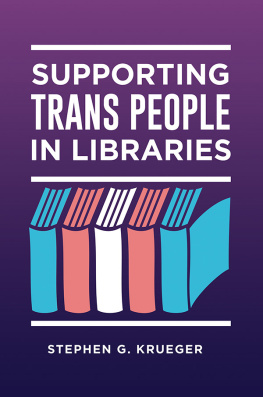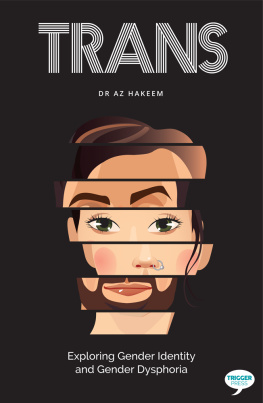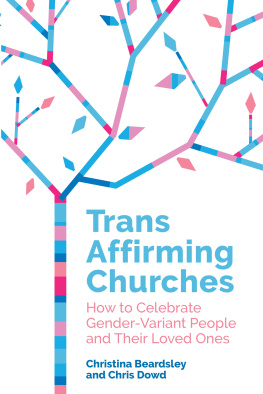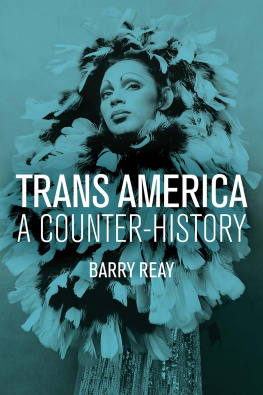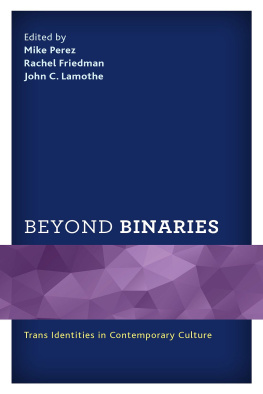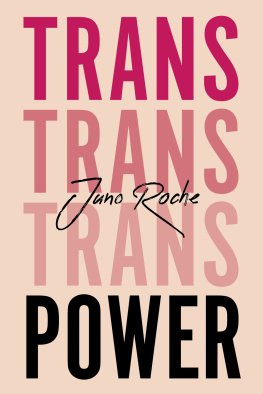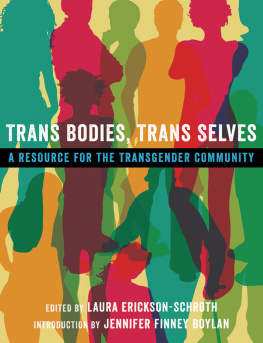Supporting Trans
People in Libraries
Supporting Trans
People in Libraries
Stephen G. Krueger

Copyright 2019 by Stephen G. Krueger
All rights reserved. No part of this publication may be reproduced, stored in a retrieval system, or transmitted, in any form or by any means, electronic, mechanical, photocopying, recording, or otherwise, except for the inclusion of brief quotations in a review, without prior permission in writing from the publisher.
Library of Congress Cataloging-in-Publication Control Number: 2019022741
ISBN: 978-1-4408-6705-7 (paperback)
978-1-4408-6706-4 (ebook)
23 22 21 20 19 1 2 3 4 5
This book is also available as an eBook.
Libraries Unlimited
An Imprint of ABC-CLIO, LLC
ABC-CLIO, LLC
147 Castilian Drive
Santa Barbara, California 93117
www.abc-clio.com
This book is printed on acid-free paper 
Manufactured in the United States of America
Community Voices icon is customer reviews by Vectors Market from the Noun Project; Personal Experiences icon is Worker by James Fenton from the Noun Project; Example Language icon is dialogue by Romain J from the Noun Project.
For the members of the Gender Variant LIS Network.
I hope this saves you some time and energy.
For BK Segall, who started me on this whole librarian track
by making libraries safe.
And for Lisa Lee Broughman, who has almost
definitely spoiled me for all other bosses.
Contents
How to Read This Book
If you want to read this book from start to finish, by all means do so; that is the best way to make sure you get all of the information. However, it is certainly not the only viable method. I designed the chapters and the sections within them to stand somewhat alone, so if you are looking for information on a specific topic or situation you can jump directly to the most relevant part. The content overlaps a great deal, though, and you will often find notes suggesting that you refer to somewhere else in the book for more information on a subject. This is to save time and avoid redundancy. For example, pronouns are relevant to almost every section, so it made the most sense to do a single detailed chapter on them and point back to it as needed. If you do read straight through, you will find that the most widely applicable chapters are at the beginning, with narrower focus near the end.
The information in this book is written from a U.S. perspective, so some of the specifics will not apply to other locations.
SECTION TYPES
Personal Experience
The whole book is in first person, but Personal Experience sections specifically describe instances from my own life. In many cases, I do not know exactly what a realistic solution would look like (for example, I have never organized a library conference and so cannot speak to the limitations involved), so I want to make it clear when I am sharing my experience rather than offering advice. Often, people with the ability to prevent transnegative situations are simply unaware that they are happening; my intention is to change some of that. I also want to highlight positive experiences, as it is very valuable to see what has worked well in practice.
Community Voices
Each Community Voices section is a contribution from another trans or gender variant library worker. I was not comfortable attempting to represent the entire community, or even letting that be implied by failing to include others experiences. I requested short pieces on any subject that people wanted to write about as long as it related to gender identity and libraries. It was very important to me that these additional voices not be filtered through my own experiences and biases, so all of the contributions were accepted without revision. As I wanted everything in this book to come from a trans and gender variant perspective, none of these come from cisgender people.
Quick Fixes
These are concrete actions that can be accomplished relatively easily over days or weeks. Adapt whichever of these fit with your work and combine them with long-term solutions.
Long-Term Solutions
These are also concrete actions, but they may take months or years to implement successfully. Pick whichever ones make sense for you and incorporate them into long-term planning.
Glossary
The glossary at the end of the book includes brief definitions of some of the words used in the book. The Terminology section of , Trans 101, has more detailed explanations of some of these. There are a great many words that are used to talk about gender, so the glossary is limited to the ones used in this book.
Acknowledgments
I dont think I truly understood how much authors mean their acknowledgment sections until now. A number of people contributed to this book in very concrete ways; many more listened to me talk through things until they made sense, offered their own perspectives, and were otherwise supportive.
First, so many thanks to those who wrote about their experiences: Max G. Bowman, Char Booth, Jay L. Colbert, Paige Flanagan, Loren Klein, Ray Lockman, Puck Malamud, JJ Pionke, Devin Spencer, and Erin White. You have added enormously to the value of this book.
Thank you to those who read and offered feedback on various bits of this book: AJ Robinson, Keely OConnell, Kodi Saylor, Nina Exner, Liz Perry-Sizemore, Jane Sandberg, and anyone else I have forgotten.
Thank you to Kalani Adolpho for talking with me about the limitations in my own views about gender. Your work is invaluable and I greatly appreciate your sharing it.
Thank you to Lisa Lee Broughman for completely ridiculous levels of support and expertise in areas that I have absolutely no knowledge of. Several sections are far more realistic because of your input.
Thank you to the nonlibrarians who offered a different perspective: Trish Norton (my mother) and Onna McKlennon.
Finally, thank you to everyone in the Gender Variant LIS Network.
Introduction
For most of my life, I could count on libraries to be spaces where I felt comfortable and safe. When I first came out as transgender, most public places came with an added level of stress and fear. Between restroom policing by security guards and misgendering at the circulation desk, libraries were no exception. When I became a library student and then a professional librarian, I found the same issues, plus additional difficulties navigating a professional environment that remains heavily gendered. The same institutions that insist everyone should feel welcome are rife with cisnormativity and transnegative practices.
After graduate school, I found myself at a college where I was the only openly trans employee (campus-wide, not just in the library). While fortunate enough to have an incredibly supportive work environment, I still felt the lack of anyone who shared my identity. This sense of isolation seems to be fairly typical among trans and gender variant library workers. It is also not even close to the worst of our workplace difficulties, which include everything from minor microaggressions to transphobia so bad we avoid coworkers or leave jobs. It has been only ten years since the Library of Congress withdrew its job offer to Diane Schroer after she came out as transgender. It is clear that libraries have a huge distance to go before we can consider them safe workplaces for people of all gender identities.
The thing is, some libraries are doing splendidly. There are places that have prominent, accessible all-gender restrooms, that maintain current collections with good representation, that provide employees and patrons with options for name and pronoun sharing, and all the rest. There are also libraries where trans and gender variant employees are driven out by hostility from coworkers or managers and where trans patrons fear harassment for using a restroom. Gender inclusion is not taught in library school, and it is rarely part of employee training. Those places that are doing well are invariably led and staffed by people who have chosen to prioritize inclusion and have the power to do it properly. Those that are problematic may have actively transphobic employees and leadership, but more often they are simply unaware of the effects of their practices.
Next page
